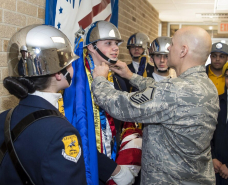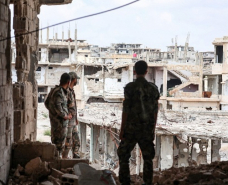Campaign launched to reform “disproportionate” military visits to Scottish schools

By Michael Gray, CommonSpace
Forces Watch, a military reform group, and the Quakers faith group have launched a petition to the Scottish Parliament in favour of increased transparency and scrutiny of armed forces visits to schools.
Previous military data revealed a “disproportionate” 1783 visits to 377 Scottish education institutions across a two year period, with at least a third of visits concerning careers advice.
ForcesWatch coordinator, Emma Sangster, said: “A new deal is badly needed on this issue as the number of visits that the armed forces make to schools has risen significantly over the past ten to twelve years. As our petition states there is 'a lack of clarity regarding the nature of armed forces visits and who is responsible for overseeing them’.
“Our fear is these visits are being used as a recruitment tool in schools, with the military promoted only in a positive light. Young people can’t be expected to have a critical understanding of the potential risks and consequences of joining up, unless they encounter a balance of views and discussion.
“Schools must ensure that the unique risks, legal obligations and ethical questions faced in the armed forces are given due consideration. We hope this petition will spark a wider public debate and see Scotland follow Wales in accepting recommendations to increase scrutiny of armed forces visits and broaden the range of employers going into schools."
Between 2010 and 2012 31 state secondary schools were visited at least 10 times. Six schools were visited at least 20 times. (Arbroath Academy, Dunfermline High School, Inverkeithing High School, Perth Academy, Balerno High School, Forres Academy)
The petition, available on the Scottish Parliament website, will run for over one month until 20 March.
Last September the Welsh Government supported “guidance” for military visits due to the “unique nature” of the military’s role in the conflict following an investigation by the Welsh parliament’s petition committee.
The committee report concluded that further research should be considered into “disproportionate number of visits to schools in areas of relatively high deprivation”.
Mairi Campbell-Jack, Scottish parliamentary engagement officer for the Quakers, said: “Quakers in Scotland are led by faith to be concerned about increasing militarisation in Scottish state schools. This issue needs scrutiny and public debate by all in Scottish society, especially parents and children themselves.”
Last month an SNP source attacked Tory plans to launch school military units in deprived areas as an attempt to use vulnerable children as “cannon fodder”. Military units are common in Scotland’s private school system.
SNP youth vice-convener Rory Steel criticised the targeting of young pupils, stating that the military “preyed on and sought to exploit” young people facing “poverty and desperation”.
“The horrific scenes in the life of a soldier are conveniently left out of [military] recruitment drives. They would rather glamorise war to entice fresh recruits with no welfare safety net or opportunity, but with an uncertain future,” Steel wrote on the party's youth website.
“But one thing is certain. While we in the UK pay the price of war with taxes; civilians abroad and our soldiers pay the price with their lives and minds. And the war profiteers hold the receipts,” he added.
Currently teenagers can apply to join the British military from as young as 15 years and seven months old, and enlist from the age of 16.
The most comprehensive investigation of military school visits, 'Armed forces visits to schools in Scotland', was published at the end of 2014 with support from Education Scotland.
Photo: Defence Images
Countering Military Recruitment

WRI's new booklet, Countering Military Recruitment: Learning the lessons of counter-recruitment campaigns internationally, is out now. The booklet includes examples of campaigning against youth militarisation across different countries with the contribution of grassroot activists.
You can order a paperback version here.








